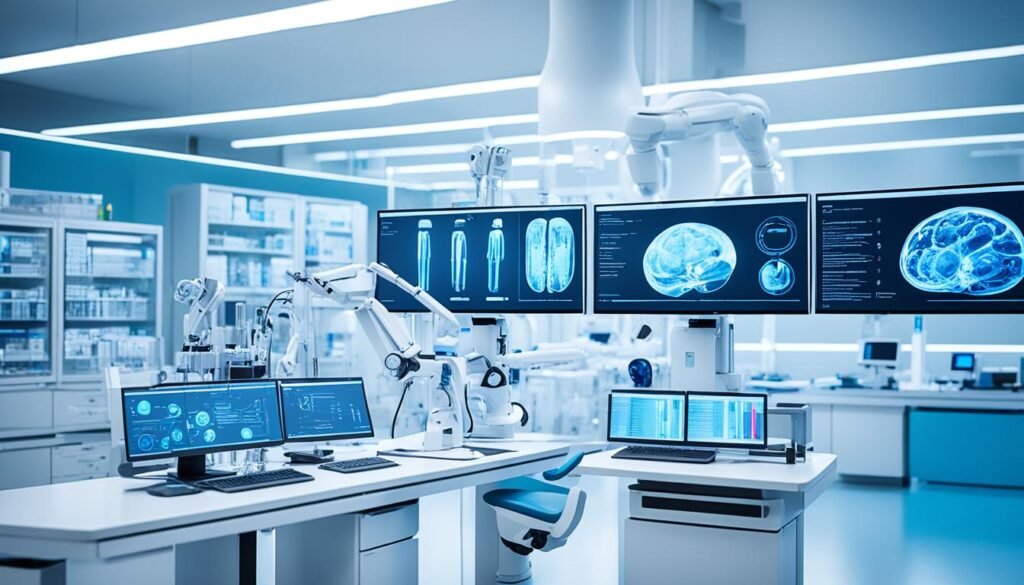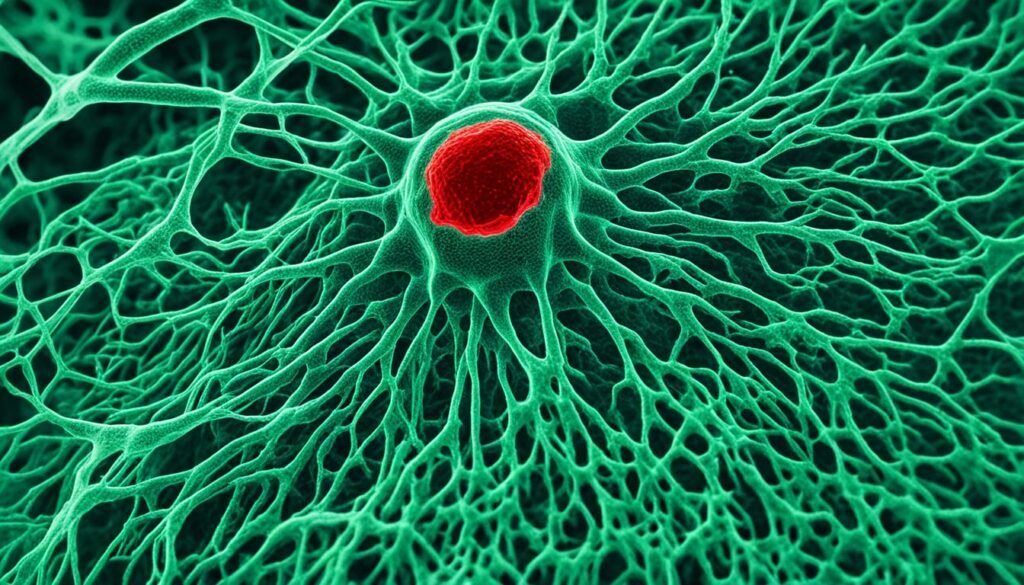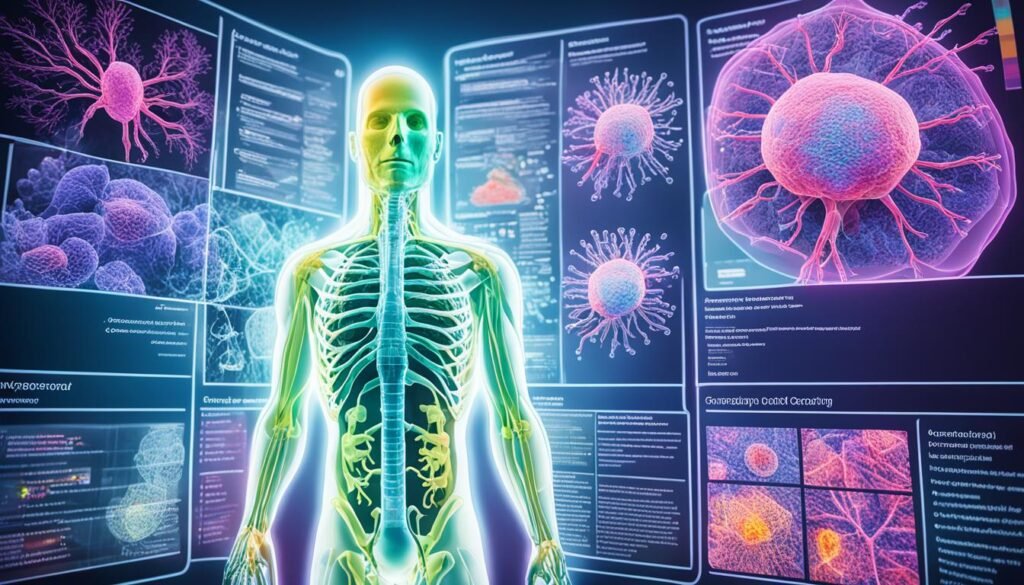A single radiologist, aided by AI, can spot breast cancer in mammograms as well as two experts. This shows how AI is changing the fight against cancer. AI is making big strides in early detection and personalized treatments.
AI can quickly learn from huge amounts of data and find patterns that humans might miss. This skill helps it analyze patient images fast, guide treatment plans, and check thousands of drugs for cancer-fighting potential.
Looking into AI’s role in cancer care, we see big changes coming. These changes will affect how we diagnose, treat, and research cancer. AI could make detecting cancer better, improve personalized medicine, speed up clinical trials, and help find new cures.
Key Takeaways
- AI can improve cancer detection accuracy, with the potential for a single radiologist supported by AI to match the performance of two radiologists.
- AI tools can aid in the diagnosis of rare and unusual cancers, predicting aggressiveness and identifying harder-to-spot types of the disease.
- AI can enhance the accuracy of cancer treatments, guiding procedures and reducing preparation time and waiting times.
- AI is set to advance personalized medicine, improving the precision of cancer treatments and preserving healthy tissue.
- AI tools are instrumental in boosting cancer research, aiding in drug discovery and expanding the understanding of cancer development.
The Potential of AI in Cancer Detection
Artificial Intelligence (AI) is changing how we find cancer early. It can quickly learn from lots of data to spot signs of cancer. This could lead to catching cancer sooner.
AI tools can check mammogram images as well as two expert radiologists. They can also find people likely to get lung or pancreatic cancer before a diagnosis. This means AI could help find cancer early, making treatments more effective.
AI’s Ability to Identify Patterns and Anomalies
AI is great at finding patterns and oddities in data. It looks at huge amounts of info, like medical images and patient records. This helps it find signs of cancer that might be missed by humans.
AI has been helping with mammogram readings for over 20 years. Now, there are more than 20 FDA-approved AI models for this task. Google’s DeepMind project has also made an AI that can spot over 50 eye diseases better than doctors using 3D scans.
AI is also helping with diagnosing cancers like breast, lung, and prostate. Tools like PathAI use AI to help doctors make better decisions faster. This could lead to better health outcomes for patients.
“AI has the potential to become one of the most powerful tools in the battle against cancer when used safely and effectively in healthcare.”
As AI becomes more common in cancer care, we see big chances for early detection and better accuracy. With new AI tech and more cancer data, the future looks promising in fighting this disease.
AI-Driven Cancer Screening and Diagnosis
Artificial intelligence (AI) is changing how we find and diagnose cancer. Researchers use machine learning to create AI tools that help spot tumors or lesions that might be missed by doctors. These AI systems could make cancer screening easier and more effective, changing how we find cancer early.
Sybil, an AI tool, looks at low-dose chest CT scans to predict lung cancer risk over six years. Another AI system can spot people at high risk of pancreatic cancer up to three years early. These examples show how AI can make finding cancer faster and more accurate.
But, as AI in cancer screening grows, there are worries about finding too many false positives and biases. It’s important for AI and radiologists to work together. They must make sure AI systems are used right, with steps to protect patients.
“The integration of AI into cancer diagnosis has the potential to revolutionize the field, but it must be done with great care and consideration for the well-being of patients.”
As AI and radiologists work closer together, they’re finding ways to use AI without losing the human touch in cancer care. The future of cancer screening and diagnosis is about combining AI with human insight for better care.

By using AI and human skills together, healthcare can make cancer detection better, more accessible, and tailored to each patient. This could lead to better patient outcomes and change oncology for the better.
Precision Medicine and Personalized Treatment
The field of cancer care is changing fast, moving towards precision medicine. This means treatments are made just for each patient’s tumor. AI technologies are leading this change, making cancer treatments more personalized and effective.
AI’s Role in Treatment Selection and Drug Discovery
AI helps doctors look at a lot of patient data, like genes, medical history, and current health. This is called ai personalized cancer treatment. It aims to give each patient the best treatment for their cancer.
AI is also speeding up how we find new cancer treatments. It looks through big datasets to find new ai drug discovery options. This new way of treating cancer is changing how we fight the disease, making ai and treatment optimization the standard.
| Key AI Applications in Cancer Treatment | Potential Benefits |
|---|---|
| Treatment selection based on patient data | Improved therapy outcomes and reduced side effects |
| Identification of novel drug candidates | Accelerated drug discovery and development |
| Prediction of drug response and resistance | Personalized treatment plans and optimized therapies |
| Integration of multi-omics data | Comprehensive understanding of tumor biology |
AI is changing cancer care for the better. It’s making treatments more personal, based on what the data says. As we keep learning and using AI, its impact on fighting cancer is clear.
Optimizing Clinical Trials and Patient Recruitment
The pharmaceutical industry has faced many challenges in conducting clinical trials. Testing new drugs is slow and expensive, with most not making it to market. But, artificial intelligence (AI) is changing this, offering new ways to make trials better and find patients.
Finding patients for trials is a big problem. It can take up to a third of the trial’s time, and some trials don’t get enough participants. AI is changing this. It uses health records and data to find the right patients for trials. This makes finding patients faster and helps speed up new treatments.
AI is also changing how trials are designed. By using AI, more patients can join trials safely. This means more people can help with research and trials better reflect the population.
| Key AI Applications in Clinical Trials | Impact |
|---|---|
| Identifying eligible patients | Improved patient recruitment and enrollment |
| Optimizing trial design and eligibility criteria | Increased inclusivity and representation |
| Predicting patient adherence and retention | Reduced drop-out rates and improved data quality |
| Automating data management and analysis | Accelerated trial timelines and insights generation |
AI is doing more than just helping with patient recruitment. It’s also managing trial data better by understanding reports and lab results. This leads to quicker insights and better treatments.
As AI becomes more common in the pharmaceutical industry, the future of cancer trials looks promising. AI is making trials more efficient and patient recruitment better. This could lead to faster progress, better patient care, and new ways to treat cancer.
“The potential of AI in transforming medicine includes improved trial design, patient recruitment and selection, safety monitoring, and drug discovery, which could lead to expedited scientific progress, better patient outcomes, and more efficient medical discoveries.”
can ai cure cancer
Artificial Intelligence (AI) is changing how we fight cancer, bringing hope and caution. It’s not a cure-all, but a tool to help doctors better detect and treat cancer. AI can improve how we find cancer early and tailor treatments.
AI is making big steps in spotting cancer early. It looks at medical images and finds patterns with great accuracy. Studies show AI can spot Parkinson’s disease and stroke risk from eye scans. This could lead to catching cancer sooner, helping patients more.
But, we must use AI carefully. AI can also reflect and worsen biases in healthcare. This means we need to tackle biases to ensure fair treatment for everyone. For example, Black patients often get less pain relief than white patients for the same pain.
The quality of data used to train AI affects its accuracy. In the UK, it took many visits to diagnose brain tumors correctly. Lupus patients often wait years for the right diagnosis. This shows we need to make sure AI is safe and fair.
Despite challenges, combining human knowledge with AI could change cancer treatment. AI can speed up finding new treatments and tailor them to patients. Researchers at UC San Francisco and IBM have made a big leap in cell biology with AI.
As AI in cancer care grows, we must work together to solve its problems. Finding the right mix of human skill and AI can lead to better cancer care. This could greatly improve life for cancer patients.
Challenges and Limitations of AI in Cancer Treatment
AI has made big strides in finding and diagnosing cancer. But, there are still big hurdles to overcome. One big worry is AI might show bias, making some tools less accurate for people with darker skin. This highlights the need for AI tools to be tested thoroughly to be fair for all patients.
Another issue is the risk of overdiagnosis. This means AI might flag every small spot as a cancer, even if it’s not dangerous. This could cause a lot of unnecessary tests and treatments, adding stress to patients. Experts say we must tackle these ethical and practical problems as AI is used more in cancer care.
Addressing Ethical and Practical Concerns
As AI tools for cancer detection and treatment grow more common, we must face the ethical and practical issues they bring. Key concerns include:
- AI Bias: Making sure AI learns from diverse data to avoid biases, especially in skin cancer detection for underrepresented groups.
- Overdiagnosis: Creating AI that can tell apart serious and harmless tumors to avoid unnecessary treatments and reduce patient stress.
- Transparency and Explainability: Making AI decisions clear and understandable to build trust and help in making informed choices for healthcare providers and patients.
- Data Privacy and Security: Protecting patient data and addressing worries about AI using sensitive medical information.
By tackling these issues, healthcare workers and AI creators can make the most of AI in cancer treatment. This ensures AI is used safely, ethically, and for the good of patients.

“As AI becomes more integrated into cancer care, it is crucial to address the ethical and practical concerns to ensure it is used safely and effectively to benefit patients.”
Collaborative Approach: AI as a Supportive Tool
In the fight against cancer, AI should not replace human expertise. Instead, it should help healthcare providers give top-notch care. Doctors and other medical pros bring valuable experience, intuition, and judgement that AI can’t match.
Working together, ai and healthcare providers collaboration can be powerful. AI gives data insights and recommendations. Meanwhile, healthcare pros use their deep patient knowledge to make treatment choices. This way, ai cancer care decision support and human skills work together for the best patient outcomes.
Recent integrating ai into cancer treatment steps show how well this teamwork works. AI tools have been okayed by the FDA to help find different cancers. They look at images deeply, spotting things the human eye might miss. This cuts down on false positives and follow-ups.
| Benefit | Impact |
|---|---|
| Faster diagnosis | AI can check and analyze tissue samples in minutes, unlike traditional methods that take days. |
| Improved accuracy | AI tools can spot breast cancer with up to 94.5% accuracy, beating human radiologists. |
| Personalized treatment | AI looks at genomic data to create treatment plans that fit each patient’s genetic makeup. |
By working together, healthcare providers can use AI and human skills for the best cancer care. This approach leads to better patient results and helps ease the healthcare system’s load.
Revolutionizing Cancer Imaging and Radiology
The field of cancer imaging and radiology is changing fast, thanks to AI. AI tools can quickly look through lots of medical images. They can spot small signs of cancer in things like mammograms and CT scans.
AI’s Impact on Medical Image Analysis
AI can find cancers in scans as well as or better than doctors. It helps speed up the process of checking images. This means cancer might be caught earlier, which can lead to better treatment.
AI cancer imaging, ai medical image analysis, ai radiology, and ai-assisted cancer diagnosis are changing oncology. These tools can look through a lot of data fast. They find patterns and things that doctors might miss. This could change how we screen, diagnose, and plan treatment for cancer, helping patients more.

AI is especially good at making breast cancer detection more accurate and quick. Breast cancer is very common and deadly. AI helps look through mammograms and other scans to catch cancer early.
AI is also promising in looking at tissue samples. It can check digital pictures of tissues, help diagnose cancer, and understand different types of breast cancer. This helps make diagnoses more consistent and reduces mistakes between doctors.
The growth of ai cancer imaging, ai medical image analysis, ai radiology, and ai-assisted cancer diagnosis is big news. It will change how we find, diagnose, and treat cancer. With AI, doctors can work faster and more accurately. This leads to better care for patients.
Integrating AI into Cancer Care Delivery
AI is changing how we handle cancer care. It helps with everything from giving out chemotherapy to making end-of-life care choices. AI systems are key in making cancer treatment better and helping patients get better results.
AI uses patient data and watches over patients in real-time. It gives personalized advice, spots patients at high risk, and makes sure patients get the right care. This use of ai cancer care integration and ai cancer treatment optimization is changing cancer care. It makes it more efficient and suited to each patient’s needs.
ai-powered cancer care and ai and cancer care delivery solutions are easing the load on healthcare workers. They can now focus more on complex decisions and caring for patients. AI automates simple tasks and gives real-time insights, changing cancer care for the better. This leads to better patient outcomes and smarter use of healthcare resources.
“AI is considered an adjunct tool, not the primary diagnostic tool in cancer care, with its main advantage being the reduction of diagnostic errors and improvement in cancer detection rates.”
But, adding AI to cancer care needs careful thought to make sure it’s safe and works well. Healthcare workers and AI experts must work together. They need to make sure AI respects patient privacy, keeps data safe, and works well in practice.
As oncology advances, using AI in cancer care will be more important. By using this technology, healthcare providers can make things run smoother, help patients more, and make big steps in fighting cancer.
The Future of AI in Oncology Research
Oncology research is changing fast, thanks to AI and machine learning. These technologies are helping find new treatments for cancer. They speed up drug discovery and help us understand cancer better.
Generative AI models like EMLy from Etcembly are leading the way. They look through millions of genetic codes to find the best T-cell receptors for cancer cells. This could lead to personalized treatments for patients.
AI is making drug discovery cheaper and faster. From August 2022 to October 2023, the FDA approved 171 AI/ML-enabled medical devices. Most were for radiology and imaging. This shows AI’s big impact on oncology research and practice.
AI is set to change cancer research a lot. It can predict treatment outcomes and spot early signs of cancer coming back. This could lead to better care for patients and a step closer to a cure.
But, using AI in oncology raises big ethical questions. We need to make sure it’s fair and respects patient privacy. Researchers and policymakers must work together to make sure AI helps patients without harming them.
In the future, AI and oncology will change how we fight cancer. We’re exploring new possibilities. The future looks bright with ai cancer research, ai drug discovery, and ai-powered oncology breakthroughs. These could be game-changers in cancer care.
“Integrating LLM technology into medical drug discovery can speed up the transition of novel treatments from the lab to the clinic, improving cancer survival rates.”
Conclusion
Artificial intelligence (AI) is changing cancer care in big ways. It helps with early detection, diagnosis, and finding new treatments. AI tools can look at medical images, spot high-risk patients, and make clinical trials better. This leads to catching cancer sooner and treating it more effectively.
For AI to work well in cancer care, doctors and AI must work together. They need to use each other’s strengths to solve problems. Issues like data privacy, security, and making fair decisions must be fixed. This ensures AI is used responsibly in fighting cancer.
As AI gets better, it will play a bigger role in ai cancer research and treatment. This could lead to new ways to fight cancer. ai cancer detection and ai cancer treatment could make treatments more effective. ai cancer care could also make things more efficient and help patients save money. With doctors and AI experts working together, the future of cancer care looks promising. It could be more personalized, efficient, and caring.
FAQ
Can AI cure cancer?
AI can change how we fight cancer by helping with detection and treatment. But, it’s not a cure-all. It should help doctors, not replace them. We must use AI wisely, keeping safety and ethics in mind. Together, AI and human skills could be key in fighting cancer.
How can AI be used in cancer detection and diagnosis?
AI can quickly learn from lots of data to spot cancer signs. Studies show it can find cancer in images as well as doctors do. It can also predict who might get certain cancers early. This could mean catching cancer sooner and treating it better.
What is the role of AI in precision medicine and personalized cancer treatment?
AI helps make precision medicine possible. It looks at lots of health data, including genes, to pick the best treatment for each patient. AI also predicts which treatments work best and finds new drug combinations for cancer.
How is AI being used to optimize the clinical trial process for cancer treatments?
AI makes clinical trials better by finding the right patients faster and safely. It looks at health records to match patients with trials. This makes trials more efficient and could lead to better cancer treatments.
What are the challenges and limitations of using AI in cancer care?
AI has made big strides in cancer care, but there are still hurdles. Some AI tools work less well for people with darker skin. There’s also worry about overdiagnosis. Experts are working on these issues as AI becomes more common in cancer care.
How should AI be integrated into cancer care?
AI should help, not replace, doctors in cancer care. It can give insights but can’t replace human experience. The best approach is to use AI and human skills together. This way, we can get the best care for cancer patients.
How is AI transforming cancer imaging and radiology?
AI is changing cancer imaging by quickly going through lots of images and spotting cancer signs. It can find cancers in scans as well as or better than doctors. This could lead to catching cancer earlier and treating it more effectively.
What is the role of AI in oncology research?
AI is becoming very important in oncology research. It helps find new drugs and understand cancer better. As AI gets better, it could lead to big advances in cancer research and treatments.
